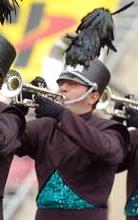In its center lies an “X,” where the journey begins. The “X” is insignificant to most and, more often than not, overlooked. But to those that understand its importance, it appears as a glimmer of hope, a uniting force among an overwhelming sea of separation; it is the heart. It is surrounded by 19 white lines that shoot across a field of green like stars across the sky; 38 hash marks that withstand the tests of time; and 3,360 footsteps, each one telling a different story of someone else’s journey, a journey that embraces blood, sweat, tears and most importantly love, the love of the field.
When most people think of a football field, they think of the players and the coaches or remember family gatherings on Labor Day weekend but never the marching bands or drum corps that bring the field to life, those who take it beyond its limitations of being just a football field, those who work for hours upon hours to reach perfection for just 15 minutes, those who live for it and dedicate their lives to it.
When I look back at the fields I have marched on and even those I haven’t, it does not matter to me how kept it was or where it was. To me, the only thing that was important was finding that “X” to bring me back to those fond memories from when I marched. I remember waking up at the crack of dawn to stretch and get ready to go out to the field to rehearse. Usually the sun was beaming down and already giving us a taste of what the heat was going to be like for the rest of the day. The birds were typically out and singing their beautiful melodies of the summertime, and the field was crawling with all types of crickets and other bugs.
Each morning, the mellophone section would wake up early and paint the field. The field always smelled like fresh paint.
Then there was that other smell, the one that seemed to be synonymous with drum corps; some even called it the scent summer (but in reality it was just sun block).
I remember standing on the field looking around and watching the other members of the corps frolic about as if they had all the energy in the world as they waited for practice to begin.
Finally, the staff would arrive and we would begin our rehearsal. We were already in immense humidity and facing a long hard day of rehearsal, and on top of all that, Mother Nature seemed to be against us. When we were on the field, however, none of that mattered. There was nothing else out there; it was the one place where we could escape the trials and tribulations of the real world. That was where no matter your race, religion, gender, sex or age, you knew we were all equal; the field stood as a great leveler.
With that came great respect for the field and all that it represented spiritually. It may just be a field but it was also a teacher, a friend and a home. The field helps to teach so many life lessons, things that most people take a lifetime to really learn to appreciate. Through the field, we were able to be taught the importance of respect and the importance of taking pride in the things you care about. We were taught never to sit on the field or to spit on it. Most people would not understand why we did not do things like that, but it allowed us to show each other the respect that we all felt.
We were taught the importance of being on time and to push through the hardships and to know that as long as we do our best and worked our hardest that no obstacle may stop us. I remember a speech given by the director about how hard we worked when we thought we were going to have an amazing season and how we did not seem to work as hard as the season began to end. He said we are not done until we fly home and that we must see through what we started, not for him or the other staff or even for ourselves. We had to do it for the people that stood on either side of us, those who are in the same boat that we were in.
To me a football field is not just another field; it is a home away from home. It is a place where no matter where I am or what I am doing, I know that someone has stood where I stand and knew exactly what it felt like to take pride in a field, to show it so much respect and to dedicate so much of your time and energy for a touch of perfection.
When you can march no longer, you know that you are only able to share that experience with those who have gone through it the same way that you have–through the blood, sweat, and tears.
The “X” stands as a guide in the exact center of the field, but it is so much more than that. It represents everything that we as performers hold dear, and it brings people together regardless of race, religion, age or gender. I know that no matter what field I go to, I will find that “X” I am looking for; I will find my way home.
About the Author
Robert D. Gagnon is a student at Santiago Canyon College working towards a bachelors degree in music education. He was the editor-in-chief of “The Legacy” yearbook at Orange (Calif.) High School. Robert has performed on a multitude of instruments including trumpet, clarinet and timpani with organizations such as the Pacific Crest Drum and Bugle Corps and the Riverside Community College.


